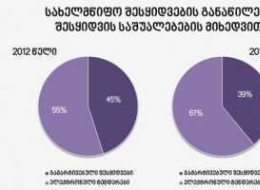
An interview with Chairman of the Competition and State Procurement Agency Levan Razmadze
You met with businessmen and discussed the issue of encouraging local producers. How will this happen?
We are working on the law at this stage, which will encourage local production - for example, if high-quality Georgian products will be put in a public tender, preference will be given to it and the manufacturer will receive subsidies from the state.
We also plan to increase the transparency of tenders. Two-stage tenders will be introduced as well as an integration of quality and price, and as a result, a profitable solution will be done both in terms of price and quality. The focus will not be placed mainly on cost, as it is now but on quality as well. The quality will be monitored by electronic devices, without a subjective opinion. The electronic system will collect all data and process them.
A two-stage tender will stimulate the bargaining for the price and will allow reducing the cost on the second phase as compared with the first.
It is known that your office has a "black list". How many companies are blacklisted?
The list includes companies that do not fulfill their obligations. To date, 78 companies are in the Procurement Agency’s "black list", and unfortunately it is growing. In percentage terms, compared with 2013, growth is not significant, because after a year companies are automatically withdrawn from the list.
In any case, it is quite large and is constantly updated. This is probably due to the fact that many companies participating in tenders are not very well informed about terms and conditions. Black list will be reduced when all will be guided by correct principles.
Today, many officials justify the shortfall in the budget saying that the companies that won the tenders do not fulfill their obligations. Is it true?
There are many reasons, and we study them. I cannot say that there is any one reason, it is necessary to comprehensively study the issue.
We should not forget that along with the black list, we also have the white list, which includes the companies conscientiously carrying out their obligations. Their number reaches 58 today.
Many companies are unhappy with the fact that to participate in the tender they are required bank and insurance guarantees. Is this restriction still in force?
Today, a lot of companies come with this kind of guarantee, as insurance companies have changed the style of work. Previously, they gave guarantees that ultimately worked against them, now they work as well as banks, and this problem is solved.
Source: commersant.ge |